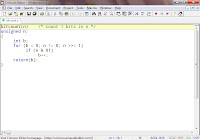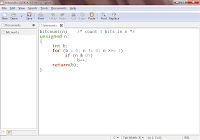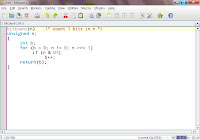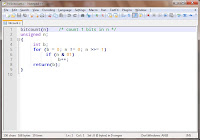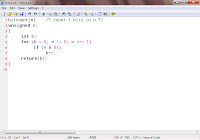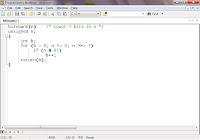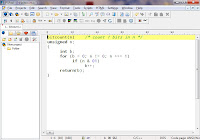Itsy-OS v0.1 is a small 8086 operating system kernel providing two basic services: a simple preemptive task switcher and memory management. If necessary, simple
IPC and task management can be added to provide the features of a traditional microkernel.
Weighing in at about 380 bytes, Itsy should port well to tiny architectures.
Memory Control Blocks
Each block of memory is preceded by a memory control block which is 32 bytes long. The blocks of memory are arranged as a circular linked list. The first memory control block resides in segment 050h.
org 0h
; -----------------------------
; [Master Memory Control Block]
; -----------------------------
M_NEXT:dw 0 ; address of next MCB
M_LAST:dw 0 ; address of previous MCB
M_PARA:dw 0 ; size of this block in paragraphs including MCB
M_FLAG:db 0 ; flags
db 0 ;
M_NPRO:dw 0 ; next MCB containing process, zero if not in queue
M_LPRO:dw 0 ; previous MCB containing process, or zero
M_STKP:dw 0 ; stack pointer
M_STKS:dw 0 ; stack segment
M_TIME:dw 0 ; time allocated / de-allocated
M_DATE:dw 0 ; date allocated / de-allocated
M_OWNR:dw 0 ; user number who owns this memory
M_NAME:db ' ' ; name of this memory block
; ---------------------------------------------------------------------------
; flag bits
F_FREE equ 01h ; zero if this is free memory
F_ACTI equ 02h ; zero if no task ready for CPU
; ---------------------------------------------------------------------------
jmp E_INIT ; setup kernel
; ---------------------------------------------------------------------------
; -------------------
; [Nucleus Data Area]
; -------------------
D_PCP:dw 0 ; segment of current process's MCB
D_SWEN:db 0 ; set to zero when switching disabled
Task Switcher
The task switcher is called by the timer interrupt. First it checks whether switching is disabled. If not:
- disable switching
- save the registers of the current task on the stack
- save the stack pointer of the current task in it's MCB
- find the next MCB with an available task
- restore the new task's stack pointer and registers
- enable switching and transfer control to the new task
; ---------------
; [Task Switcher]
; ---------------
E_SWITCHER:
; test if the switcher is enabled or disabled (indivisible test and set)
pushf
push cx
xor cx,cx
cs xchg cl,byte[D_SWEN]
jcxz N_NOSWITCH
; save the registers of the current process
push ax
push dx
push bx
push bp
push si
push di
push es
push ds
; save the stack of the current process
mov di,M_STKP
cs mov ds,word[di+D_PCP-M_STKP]
mov word[di],sp ; M_STKP
mov word[di+2],ss ; M_STKS
E_SHORTCUT:
; select an active task to switch to
N_SELTASK:
mov ds,word[di-4] ; M_NPRO
test byte[di-6],F_ACTI ; M_FLAG
jz N_SELTASK ; is this task active?
cs mov word[di+D_PCP-M_STKP],ds
; restore saved state of process being switched to
mov sp,word[di] ; M_STKP
mov ss,word[di+2] ; M_STKS
pop ds
pop es
pop di
pop si
pop bp
pop bx
pop dx
pop ax
call E_ENABLE
N_NOSWITCH:
pop cx
popf
iret
Deallocate Memory
Called with DS =
MCB of memory to free. Deallocated memory is wiped with 0CCh.
Switching is disabled while the memory structure is being modified. If the memory being deallocated contains a process, it is removed from the process queue. If adjacent memory blocks are marked as free, the blocks are combined.
; -------------------
; [deallocate memory]
; -------------------
E_MEMDEALLOC:
cs mov byte[D_SWEN],0 ; disable switching
xor di,di ; M_NEXT
mov ax,word[di+M_NPRO] ; see if there is entry in process queue
test ax,ax
jz N_NOPROC ; if there isn't, simply free the memory
mov es,word[di+M_LPRO] ; and if there is, remove it!
es mov word[di+M_NPRO],ax
mov bx,es
mov es,ax
es mov word[di+M_LPRO],bx
mov ax,ds
cs cmp ax,word[D_PCP] ; check if process being killed is the current
jnz N_NOPROC
cs mov word[D_PCP],bx ; if so, set last process as current
call N_NOPROC ; free the memory,
mov di,M_STKP
jmp short E_SHORTCUT ; and then afterwards, switch to another task
N_NOPROC:
mov bp,ds ; bp = first paragraph to clear
mov bx,word[di+M_PARA] ; bx = number of paragraphs to clear
mov es,word[di]
es test byte[di+M_FLAG],F_FREE ; is next block free?
jnz N_NNOTJOIN ; if not, can't join them
es mov ax,word[di+M_PARA] ; get size of next block
add word[di+M_PARA],ax ; add to size of this block
es mov ax,word[di] ; move M_NEXT of next...
mov word[di],ax ; ...to M_NEXT of current
inc bx ; an extra 2 paragraphs to clear
inc bx
N_NNOTJOIN:
and byte[di+M_FLAG],0FFh-F_FREE-F_ACTI ; mark as free
mov es,word[di+M_LAST]
es test byte[di+M_FLAG],F_FREE ; is previous block free?
jnz N_PNOTJOIN ; if not, can't join them
mov ax,word[di+M_PARA] ; get size of this block
es add word[di+M_PARA],ax ; add to size of previous block
mov ax,word[di] ; move M_NEXT of current...
es mov word[di],ax ; ... to M_NEXT of previous
jmp short N_EXTRA2P
; block already marked as free
N_PNOTJOIN:
inc bp ; don't clear MCB
inc bp
dec bx
dec bx
N_EXTRA2P:
cld ; clear memory - bp=location, bx=paragraphs
mov ax,0CCCCh ; code for an INT3 instruction to fill memory with
mov dx,01000h
N_CLRGO:
mov es,bp
sub bx,dx
jc N_CLRFIN
mov cx,08000h
rep stosw
add bp,dx
jmp short N_CLRGO
N_CLRFIN:
add bx,dx
mov cl,3
shl bx,cl
mov cx,bx
rep stosw
E_ENABLE:
cs inc byte[D_SWEN] ; enable switching
ret
Allocate Memory
Called with AX = number of paragraphs required. Returns DS = location of memory, or DS = 0 if no memory available. Switching is disabled while the memory structure is being modified. Allocation uses a simple best fit algorithm.
; -----------------
; [allocate memory]
; -----------------
E_MEMALLOC:
cs mov byte[D_SWEN],0 ; disable switching
xor di,di
xor dx,dx ; segment of current choice
xor cx,cx ; left-over memory from current choice
inc ax
inc ax
mov bx,050 ; MMCB
N_MOREMEM:
mov ds,bx
test byte[di+M_FLAG],F_FREE ; is the block we are looking at empty?
jnz N_WONTFIT ; if it isn't, move on
mov bx,word[di+M_PARA]
sub bx,ax ; check size
jc N_WONTFIT
jz N_EXACT ; perfect fit :-)
; ** KLUDGE ***
cmp bx,3 ; if leftover memory block smaller than 3
jc N_WONTFIT ; paragraphs, it would be too small to contain
; a MCB. Maybe handle this better later
cmp cx,bx ; bx= size of potential leftover memory block
jc N_WONTFIT ; have we found a better fit?
mov cx,bx
mov dx,ds ; if so, then select it!
N_WONTFIT:
mov bx,word[di] ; M_NEXT
cmp bx,050 ; are we at MMCB?
jnz N_MOREMEM
test dx,dx
jne N_ALLOCIT
mov ds,dx ; out of memory :-(
jmp short N_ALEXIT
N_ALLOCIT:
mov ds,dx
mov es,word[di] ; M_NEXT, es= next block
mov bx,word[di+M_PARA] ; bx= number of paragraphs for this block
add bx,dx ; bx= end of this block
sub bx,ax ; bx= location of new block's MCB
es mov word[di+M_LAST],bx ; point next block to new block
mov word[di],bx ; M_NEXT, point this block to new block
sub word[di+M_PARA],ax ; resize this block
push ds
mov ds,bx ; point es to new block
pop bx
mov word[di+M_LAST],bx ; initialise new block's M_LAST
mov word[di+M_PARA],ax ; initialise new block's M_PARA
mov word[di],es ; initialise new block's M_NEXT
N_EXACT:
mov byte[di+M_FLAG],F_FREE ; mark new block as no longer free
mov word[di+M_NPRO],di
mov word[di+M_LPRO],di
N_ALEXIT:
jmp short E_ENABLE
Setup
Simply sets up the timer interrupt.
E_INT1C:
call E_SWITCHER
db 0EAh
D_OLDINT1C:
dw 0,0
; ---------------------------------------------------------------------------
E_INIT:
push cs
pop es
xor ax,ax
mov ds,ax
mov si,01Ch*4
mov di,D_OLDINT1C
cld
push si
movsw
movsw
pop di
cli
push ds
pop es
mov ax,050h
stosw
mov ax,E_INT1C
stosw
sti
; ...

